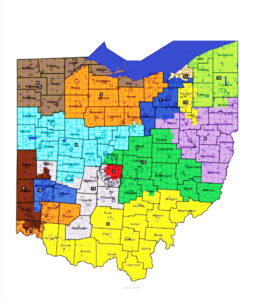The ‘railway that never was’ tracked through Kinsman
EDITOR’S NOTE: This is part of a weekly series on our region’s history coordinated by the Trumbull County Historical Society.
In the heart of Kinsman, there lies a forgotten relic of the past — a testament to an era of ambition and innovation.
The Clinton Air Line Railroad, a once-promising project that aimed to expand transportation in the late 19th century, now stands as a haunting reminder of dreams unfulfilled. One of the most frequently requested local history topics at Kinsman Free Public Library is the Clinton Air Line, known as “the railway that never was.”
The namesake of the railroad, DeWitt Clinton Jr. of New York, envisioned a railway that would span from the Atlantic Ocean to the Missouri River.
Before the time of actual air travel, an “air line” was a railroad that maintained a relatively straight and flat route promising to be a more efficient means of travel. It wasn’t until 1852 that the Clinton Air Line Railroad Company was chartered and organized.
With the path of the proposed railroad passing through Hudson, Ohio, Professor Henry Noble Day of Western Reserve College jumped at the chance to turn his town into a transportation hub. As early as 1833, Day was making plans and working to secure investors.
At the time, railroads were a sound investment. The residents of Hudson saw the success of the Cleveland-Pittsburgh Railroad, completed in 1852, and in turn heavily invested more than $200,000 in this new endeavor.
Through these investments, the residents believed they were contributing to and ensuring the growth of their community. Day, the main proponent of the project, became president of the Clinton Line headquartered in Hudson. With funding secured, a survey was promptly completed, and land acquisition efforts commenced.
By 1853, the raised roadbed was nearly finished from Kinsman to Parkman Township. The path of the railroad within Trumbull County had it entering Ohio in northeast Kinsman, traversing the township diagonally and eventually crossing into Gustavus Township before taking a southward turn into Mecca.
From there, it continued westward in a straight line, passing through Mecca, Bristol and Farmington townships before crossing into Portage County.
Ambition got the better of those involved, and the project expanded into three lines: The Clinton Line extending from Hudson east through Trumbull County to the Pennsylvania border, the Clinton Line Extension heading west from Hudson to Tiffin and the Hudson & Painesville, which would connect Hudson to Lake Erie. Financial difficulties arose, caused by construction complications and compounded by the Panic of 1857. Work on the railroad was suspended, and the two companies defaulted. None of the lines were completed.
The town of Hudson was hit hard by this failure and was thrown into a lengthy economic depression. No track or ties were ever laid in Kinsman. The Parker family letters in the Kinsman Historical Collection show evidence of the Clinton Air Line in Kinsman. The Parkers made observations of the new laborers coming to town.
Also, Kinsman farmers were consulting each other on how much to charge the company to lease their land.
Other local residents bought shares in the company. By all accounts, Kinsman was not as financially damaged when the project was halted. Attempts were made to revive the line, notably by Kinsman resident D. M. Yeoman in 1887. Yeoman was quite determined to get the railroad built, going so far as traveling to England on railroad business. Despite his confidence, no attempts to revive the lines were successful.
Over the years, the abandoned raised roadbed gradually became a part of Kinsman’s landscape, slowly fading into obscurity. Although Kinsman and Hudson may not have been connected by the iron rails of the Clinton Air Line, they share the common experience of a project that once held the promise of transformation, but ultimately found its place among America’s unfinished chapters.
For more information, visit Kinsman Free Public Library at www.kinsmanlibrary.org or Hudson Library & Historical Society at www.hudsonmemory.org.

